How to Write a Scientific Paper: An Academic Self-Help Guide for PhD Students
Jari Saramäki
Completed: 5 Sep 2023

Jari has an excellent blog where one should go for constant writing advice. Writing is tough. This book gives concrete advice on the system and workflow for scientists to write their paper. Its targeted and focused. It tells you how to structure a paper, write words (yes the toughest part), how to present data, generate captions and write the cover letter. It's a book that's meant to be use step by step through the scientific writing process and it's definitely a book I will keep by my side through my writing endeavours.
Make Your Bed
William H. McRaven
Completed: 2 Sep 2023

Short and quick book that can be finished in 2 hours. But highly motivational and touching stories. Making our bed in the morning starts off your day with one successful task. Cascading you along many others that might be difficult. Admiral McRaven is an excellent writer and speaker who sums up his points in short and sweet stories.
Be a person of character and heart even in the toughest of times. Never ring the bell to quit. Whatever that bell might be - whether it be an easy career, running away from your relationships etc...
Life is not fair and it will never be. Just keep moving forward. No one has regret going through a tough time. They have only regretted quitting. Keep chasing your dream and don't be afraid of sharks
Atomic Habits: An Easy & Proven Way to Build Good Habits & Break Bad Ones
James Clear
Completed: 30 Aug 2023
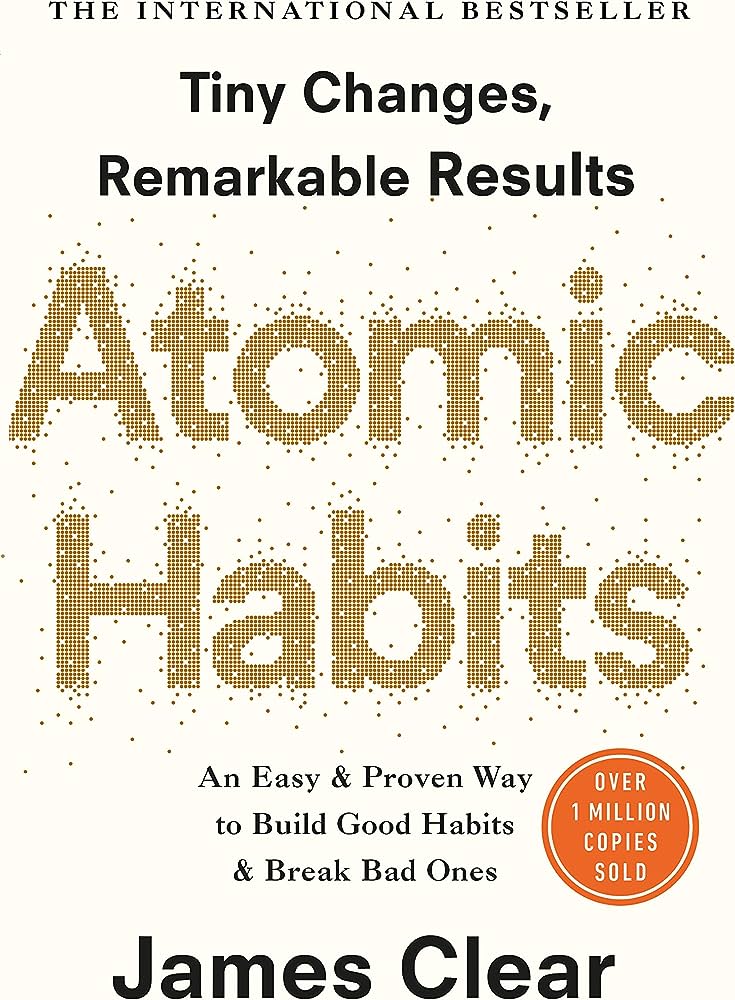
Great book. Extremely motivational and gives many examples to how to improve your life. I will list some of the most impactful points.
- We are our identity. Don't say you are someone who is trying to quit smoking but tell yourself you are a non-smoker. Say out your identity and the habit will follow.
- Brain hacking and habit stacking. Do one thing after another and the dopamine rush from feeling the success will slowly cascade.
- Compound interest works wonders once again. Make a 1% increase to yourself every single day and the results at the end will be remarkable. Get your reps in. There is simply no substitute.
- Every single day our decisions bifurcate. Treat everything as a small tree of decisions that lead to an ultimate goal rather than being intimidated by a big goal at the end.
- No one has ever regretted not showing up to something hard. You only regret not showing up and doing somethign else.
- Rig the game for yourself. Find intersections of niches that will benefit you. You may be the top 10% in one area but if you're the top 10% in 5 areas that will put you in the top 0.001% of people.
Ikigai: The Japanese Secret to a Long and Happy Life
Francesc Miralles & Hector Garcia
Completed: 24 Aug 2023

Easy to read book that takes a semi-spiritual and semi-scientific view on longevity. At it's surface, the authors' goal was to investigate why individuals in Okinawa regularly live past the age of 100. However, their quests provoke far deeper thought within the reader: What is one's purpose in life? Are we watching what we eat? Are we breathing? Do we have good habits? This book is great for those who are going through an existential crisis or myself personally who want positive affirmation on my life choices thus far.
The natives of Okinawa seem contented with their life. They remain active into their twilight years. They continually practice their crafts they have dedicated their lives to - such as Sushi, woodworking, drawing and even physics. Get in shape and exercise. Be in tune with the lovelies of Nature. Be grateful to what you have. There is an Ikigai inside each of us, a passion that is hidden and to be discovered. It is something that wakes us up in the morning excited.
The most impactful chapter was on the state of flow. Flow is the state in which time seems to lose it's meaning. You get so engrossed in your work you forget all physical desired such as the need to sleep or eat. Enter it by minimizing distractions and stop multitasking! Find the thing in life that regularly gets you into that flow state, continue to do it into your elderly years and the author claims you will live a long and fulfilling life.
Little Book of Common Sense Investing: The Only Way to Guarantee Your Fair Share of Stock Market Returns
John C. Bogle
Completed: 22 Aug 2023
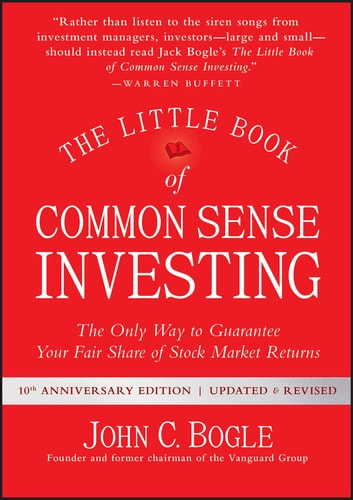
Very often I find myself chasing returns. In retrospect, my personal philosophy to investing should be such that the bulk of my time is dedicated to works I'm most passionate about. John Bogle created Vanguard because he recognized the effects costs have on one's investments. He advocates for simplicity and safety. Many feel investing needs to be complicated; if we aren't putting in their homework then we don't deserve their returns. I argue on the contrary that the hardest thing in investing is sticking to a good and conservative plan - for the greatest enemy of good plan is the dream of a perfect plan (Quote by Carl von Clausewitz)
Now, I call myself a Boglehead! Proudly so too. He stresses that a large majority and active managers are unable to beat the S&P500. These are individuals who have a top-notch education, Bloomberg terminals and supercomputers with nanosecond delay. If they cannot turn a profit by stock picking or fancy strategies then it is unlikely (without luck) that I will be able to generate alpha over the market. A great and surefire strategy is to buy the haystack instead of finding the needle. 95% of your investments should be in a well-diversified low-cost index fund. The other 5% acts as a possible generation of alpha and to learn about companies you otherwise would not have heard of. And of course to soothe the itchy trigger finger I'm sure all investors can relate to.
Stop Reading The News
Rolf Dobelli
Completed: 19 Aug 2023
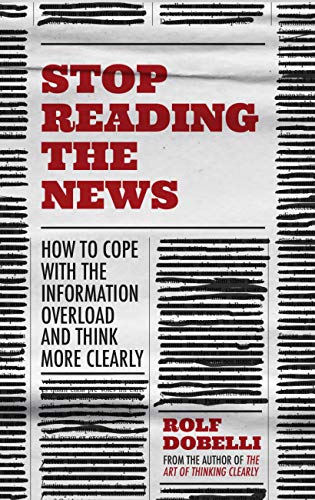
From young, I was told that reading the news was a good thing. I concede that at a young age news helps one to listen, read and build vocabulary. Past a certain age, this is no longer true and reading the news brings not benefit to one's writing. Instead, it becomes an endeavor that wastes away at our valuable time.
Understand that news websites are in the business of keeping our attention. Most news we read is completely irrelevant to any of our decision-making. Never in my life have I ever used the news to make an informed decision. I can also barely recall any news from the last decade other than headline events - that tree that fell, almost hitting a car and then being reported had no material impact on my life.
I have since cut out short-form news/content and replaced it with long-form books, textbooks, essays etc. Reading the news, as Dobelli argues, has a negative impact on concentration and increases negativity in one's life. Since cutting out news, my reading stamina has increased greatly. I used to struggle to read long scientific journal articles, but now it has become easier, and I attribute it to the lessons learned in this book.
A PhD is Not Enough. A Guide to Survival in Science.
Peter J. Feibelman
Completed: 13 Aug 2023

Direct & actionable. This book gives immediately implementable advice on how to improve your scientific career from the moment you put the book down. Some of my highlights:
- When finding a PhD or postdoc advisor always go for someone senior and tenured. They will not be afraid to be undercut and treat you like more their academic children.
- A seminar or presentation is like theatrics. Treat it as such. The audience has no reason to listen to you unless you perform and captivate. Remove the outline of the presentation; when someone goes for a play, no one orates the outline at the start. Be generous with the introduction and keep it simple - people, no matter how senior, like to hear things they understand.
- A paper is like an advertisement. The main paper should tell people why your work is interesting and what is achieves scientifically. Pedantic technical details belong in the appendix, so the paper can be entirely reproduced. Abstracts less than 75 words, so people are inclined to read them. Citations are not just to cite information but to gain respect from the community.
How to Win Friends and Influence People
Dale Carnegie
Completed: 11 Aug 2023
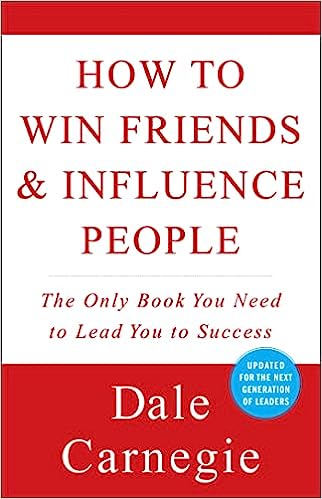
Incredible book. At least 10 stories per chapter illustrate the point Dale Carnegie is trying to make in a succinct and show-not-tell manner. Exposition is gripping and impactful. In my top 10 recommendations. Some personal learning points:
- People love affirmation and dread condemnation. No one will do anything unless they want to. Make them crave their inner desire for affirmation, and you will have them do what you want.
- Always share what's in it for the person you want something from. E.g. when writing a personal statement or emailing for a job say how their organization can flourish. Share what you bring to the table. Too many times we share what are achievements are... frankly no one cares.
- Smile, listen and talk in terms of other's interests. Make others feel important about themselves.
- When negotiating, do it from the perspective of the person across the table. Try to negotiate for terms that benefit them and don't mention your own interests if possible. Get a few quick 'yes' from the other person and they will be more inclined to continue saying 'yes' when it comes to more difficult terms.
- Always praise. Never call out mistakes directly but show the person is valued and share how they can improve to better themselves.
Quantum Bullsh*t How to Ruin Your Life with Advice from Quantum Physics
Dr Chris Ferrie
Completed: 4 Aug 2023
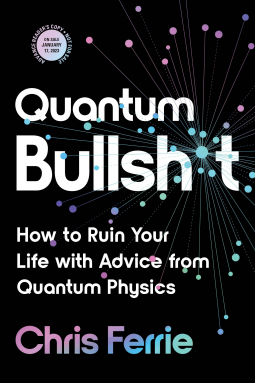
From the bestselling children's science author Quantum Physics for Babies... which I am proud to say I own! Sufficed to say, this is perhaps the antithesis of a children's book. Hilariously roasting pseudoscience at every turn of the page, the charming vulgar exposition used in this book jibes at those who bastardize the "quantum-ness" of our world. If you lack any background in physics, this book elucidates enigmatic concepts in every day speak such as the subtle difference between the uncertainty principle and quantum randomness; the double slit experiment; Schrödinger's cat etc. At the end of every chapter, he brings to light the common ploys that fall under "Quantum Bullsh*t" such as healing crystals, 5G brainscans and Qompanies that cannot resist putting the letter "Q" in front of their name to swindle venture capitalists.
Great as a gift! But I wouldn't pick up this book again as a physics undergraduate. It's a little too easy of a read if you've had any formal training in quantum mechanics. But it's fun to see the downright bizarre conspiracy theories people cook up. Not that we should look down on them. What the author is doing is great, which is to explain proper science to the layman - a skill most scientists lack; for that which we cannot comprehend becomes that which we fear.